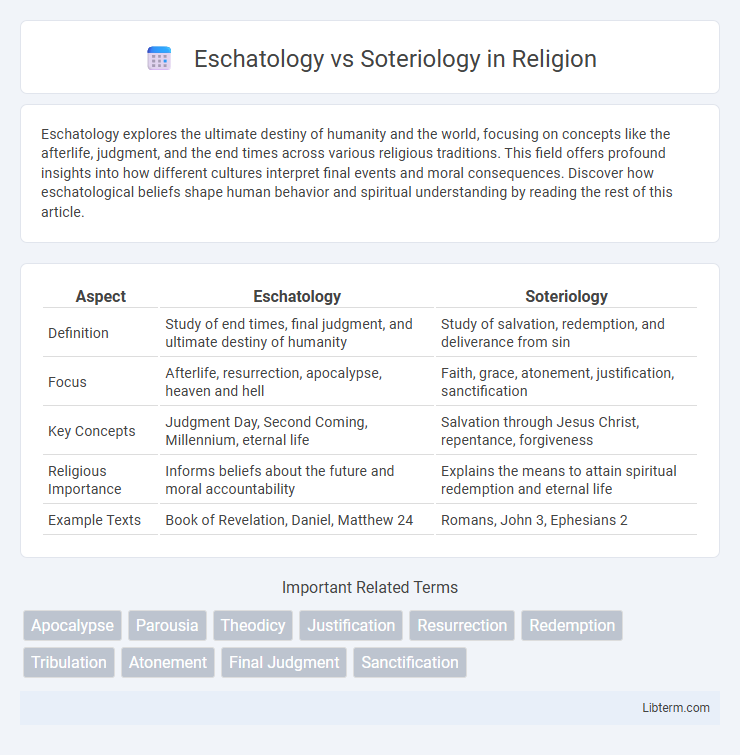Eschatology explores the ultimate destiny of humanity and the world, focusing on concepts like the afterlife, judgment, and the end times across various religious traditions. This field offers profound insights into how different cultures interpret final events and moral consequences. Discover how eschatological beliefs shape human behavior and spiritual understanding by reading the rest of this article.
Table of Comparison
| Aspect | Eschatology | Soteriology |
|---|---|---|
| Definition | Study of end times, final judgment, and ultimate destiny of humanity | Study of salvation, redemption, and deliverance from sin |
| Focus | Afterlife, resurrection, apocalypse, heaven and hell | Faith, grace, atonement, justification, sanctification |
| Key Concepts | Judgment Day, Second Coming, Millennium, eternal life | Salvation through Jesus Christ, repentance, forgiveness |
| Religious Importance | Informs beliefs about the future and moral accountability | Explains the means to attain spiritual redemption and eternal life |
| Example Texts | Book of Revelation, Daniel, Matthew 24 | Romans, John 3, Ephesians 2 |
Defining Eschatology: Study of Last Things
Eschatology, the theological study of last things, examines concepts such as death, judgment, heaven, hell, and the ultimate destiny of humanity. It explores prophetic visions and apocalyptic literature found in scriptures like Revelation and Daniel, focusing on events like the Second Coming of Christ and the final judgment. Distinct from soteriology, which centers on salvation and redemption through Christ, eschatology emphasizes the culmination of human history and eternal outcomes.
Unpacking Soteriology: Doctrine of Salvation
Soteriology, the theological study focused on the doctrine of salvation, explores how humanity is redeemed from sin and its consequences through divine intervention. It examines key concepts such as atonement, justification, sanctification, and grace, emphasizing the role of Jesus Christ's sacrifice and the believer's faith in achieving eternal life. This discipline contrasts with eschatology, which primarily addresses the ultimate destiny of humanity and the final events of history rather than the process of individual salvation.
Core Differences Between Eschatology and Soteriology
Eschatology explores the final events of history, including death, judgment, and the ultimate destiny of the soul and humankind, emphasizing concepts like the afterlife, resurrection, and the end times. Soteriology centers on the doctrine of salvation, detailing how individuals are redeemed from sin through faith, grace, and the role of Christ as Savior. The core difference lies in eschatology's focus on ultimate outcomes and cosmic completion, while soteriology concentrates on the process and means of salvation within a believer's spiritual journey.
Eschatology: Key Themes and Concepts
Eschatology explores the final events of history, the destiny of humanity, and the ultimate fulfillment of divine purpose, encompassing themes like resurrection, judgment, heaven, and hell. Central concepts include the Second Coming of Christ, the establishment of God's kingdom, and the final judgment that separates the righteous from the wicked. This theological study provides insight into the hope and warnings conveyed in Scripture regarding the end times and eternal life.
Soteriology: Essential Beliefs and Components
Soteriology centers on the study of salvation, detailing the essential beliefs and components that define how individuals attain spiritual redemption and eternal life. Core elements include the concepts of grace, faith, repentance, and the role of Jesus Christ as the savior, emphasizing the transformative process of justification, sanctification, and glorification. Understanding soteriology involves exploring doctrines related to atonement, redemption, and the application of salvation in the believer's life within various Christian theological traditions.
Interconnections: Salvation’s Role in End Times
Eschatology explores the ultimate destiny of humanity and the world, emphasizing events like judgment and resurrection, while soteriology focuses on salvation through faith and grace. The interconnection lies in salvation's decisive role during the end times, where soteriological concepts determine individuals' eternal outcomes addressed in eschatological narratives. Understanding this relationship highlights how salvation shapes eschatological expectations of redemption, judgment, and eternal life.
Eschatology Across Major World Religions
Eschatology in major world religions explores beliefs about the end times, the afterlife, and final judgment, with Christianity emphasizing the Second Coming of Christ and resurrection, Islam focusing on the Day of Judgment and paradise or hell, and Hinduism presenting cycles of rebirth and karma culminating in moksha. Soteriology, in contrast, deals with the doctrines of salvation, interpreting how individuals achieve liberation or redemption across various faiths. Understanding eschatological concepts is crucial for comprehending religious perspectives on ultimate destiny and moral accountability.
Soteriology in Various Theological Traditions
Soteriology, the study of salvation, holds distinct interpretations across theological traditions, emphasizing different means and outcomes of redemption. In Christian theology, soteriology often centers on the role of Jesus Christ's death and resurrection as the foundation for atonement and eternal life, contrasting with eschatology's focus on end-time events and ultimate judgment. Various traditions such as Catholicism, Protestantism, and Eastern Orthodoxy articulate unique soteriological doctrines, including justification by faith, sanctification, and theosis, reflecting diverse understandings of how salvation is attained and experienced.
Contemporary Debates: Eschatology vs Soteriology
Contemporary debates in theology highlight significant tensions between eschatology, the study of end times and ultimate destiny, and soteriology, the doctrine of salvation and redemption. Scholars argue over which doctrine holds primacy in shaping Christian belief and practice, with eschatology emphasizing future hope and cosmic fulfillment, while soteriology centers on present spiritual transformation and individual salvation. The interplay between these fields influences contemporary interpretations of scripture, ecclesiology, and ethical living within various Christian traditions.
Practical Implications for Faith and Life
Eschatology shapes practical faith by influencing believers' perspectives on the afterlife, judgment, and the ultimate destiny of humanity, which encourages ethical living and hope amid suffering. Soteriology impacts daily life by emphasizing salvation through grace, fostering a personal relationship with God and motivating moral transformation and evangelism. Together, these doctrines guide believers in understanding their spiritual journey and purpose, integrating eternal hope with present actions.
Eschatology Infographic

 libterm.com
libterm.com